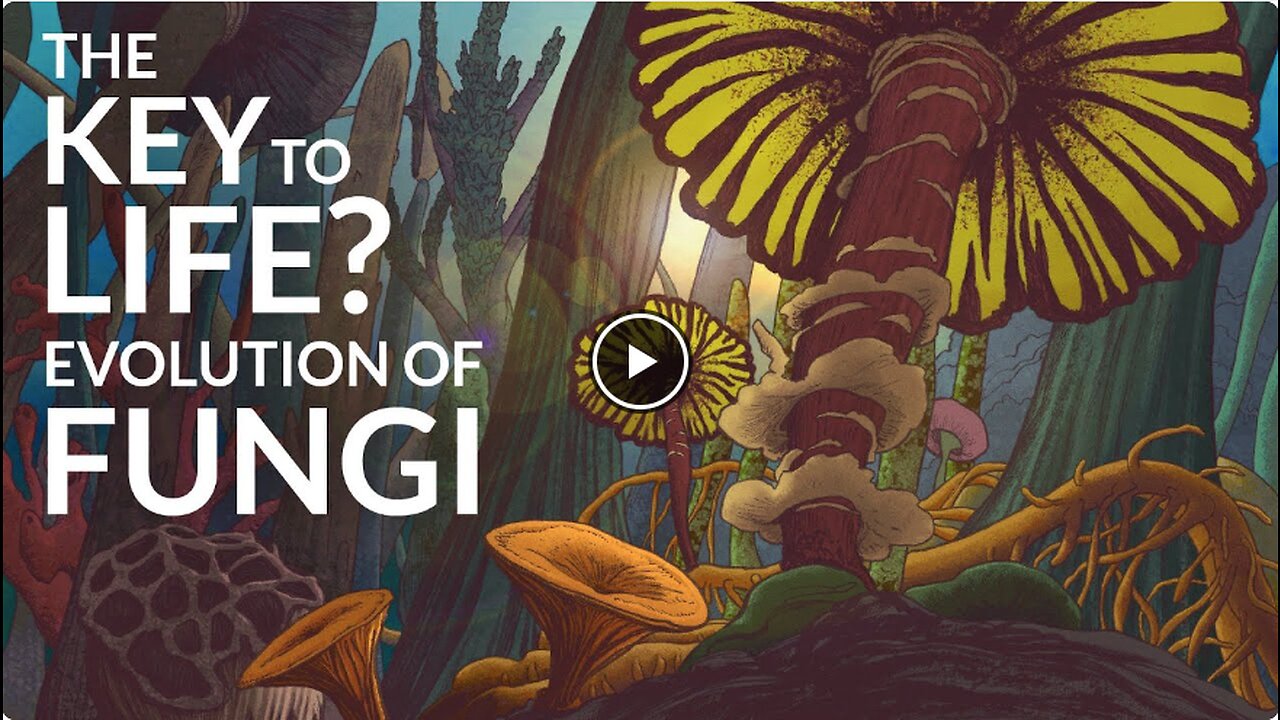Premium Only Content

The Key to Life: Evolution of Fungi
Fungi are one of the most interesting living beings found on our planet. They predate man by hundreds of millions of years and are extremely important to the environment, but they can sometimes also be destructive. Fungi break down organic matter, which releases carbon, oxygen, nitrogen, and more into the soil to enrich it and the atmosphere. They are a mysterious life form and hard to classify as either plant or animal, so they belong to their kingdom apart from both, and the differences are mainly due to how fungi consume nutrients.
Animals, like human beings, for example, eat their food, which their bodies then break down to absorb nutrients. Plants rely on photosynthesis; they make their own food internally using the Sun. On the other hand, Fungi use Mycelium, the root-like structure you find on every mushroom, to secrete enzymes that digest nutrients externally. However, despite the differences, Fungi are often lumped together with plants but share more similarities with animals since both break down and absorb their nutrients.
There is this perception that fungi are small, plant-like things, but they can grow quite big. The largest single organism currently alive on the Earth is a 3.5 square-mile fungus growing underneath the Malheur National Forest in Oregon. Its Mycelium has spread out in a vast web-like network underneath the forest floor, attaching itself to trees and supporting the forest floor.
Once upon a time, giant mushrooms dotted the landscape with trunks that went up to 20 to 30 feet, based on recently found fossils. Fungi are fast and efficient when they grow and can even break through Kevlar, and they have even been found inside tanks of nuclear waste matter in Chernobyl.
Fungi’s contribution to the development of the planet is unmeasurable. They helped the first ocean-based organisms that walked onto land colonize the Earth and did it all over again to rebuild after mass extinction events. They most probably helped plants to live on land because the plants didn’t have the roots to hold the soil yet, so the mushrooms helped them grow. Penicillin is fungus derived, as are many other medicines that lower cholesterol and enable organ transplants. It is also essential to many things we eat, including bread, cheese, and alcohol such as beer and cheese.
And because they can survive in space, they could even have played a more significant role in creating the Universe. The future holds possibilities too. If fungus can eat nuclear radiation and toxic chemicals, they might be able to break down plastic and solve a major environmental crisis. When humanity finally goes out into space to explore, fungi can even help terraform new planets to make them habitable.
This fascinating life form almost seems alien-like, both helpful and harmful, yet it has influenced much of our development and will likely continue long into our future.
Directed by: Pete Kelly
Source: https://youtu.be/KH9JVy-u5DQ
-
 5:23
5:23
Biological Medicine
7 hours agoTake A Good Listen. Write Down The Names You Hear. Look Them Up as Much As You Can!!!
650 -
 1:56:04
1:56:04
TheDozenPodcast
14 hours agoMass deportations, Islamists, Saving the UK: Nick Tenconi
4.15K8 -
 35:24
35:24
Survive History
18 hours ago $1.53 earnedCould You Survive in a Cavalry Regiment During the English Civil War?
20.3K3 -
 28:15
28:15
Degenerate Plays
13 hours ago $0.91 earnedTwo Birds' Secret Meeting - Gotham Knights : Part 26
42.5K3 -
 12:29
12:29
Mr. Build It
5 days agoWish I Knew This Before I Started Building It
43.1K15 -
 2:03:57
2:03:57
Megyn Kelly
2 days agoNew Trump Derangement Syndrome, and How CNN Smeared a Navy Veteran, w/ Piers Morgan & Zachary Young
143K176 -
 10:05
10:05
DIY Wife
3 years agoHow We Flip Old Furniture For Profit!
73.3K58 -
 2:14:54
2:14:54
TheSaltyCracker
11 hours agoTrump Goes Gangster ReeEEeE Stream 01-26-25
171K334 -
 4:42:13
4:42:13
Due Dissidence
20 hours agoTrump Calls To "CLEAN OUT" Gaza, Swiss ARREST Pro-Palestine Journalist, MAGA's Hollywood Makeover?
72.2K97 -
 2:02:20
2:02:20
Nerdrotic
12 hours ago $20.31 earnedDECLASSIFIED: JFK, MLK UFO Immaculate Constellation Doc | Forbidden Frontier #089
92.8K17